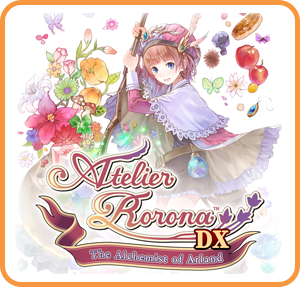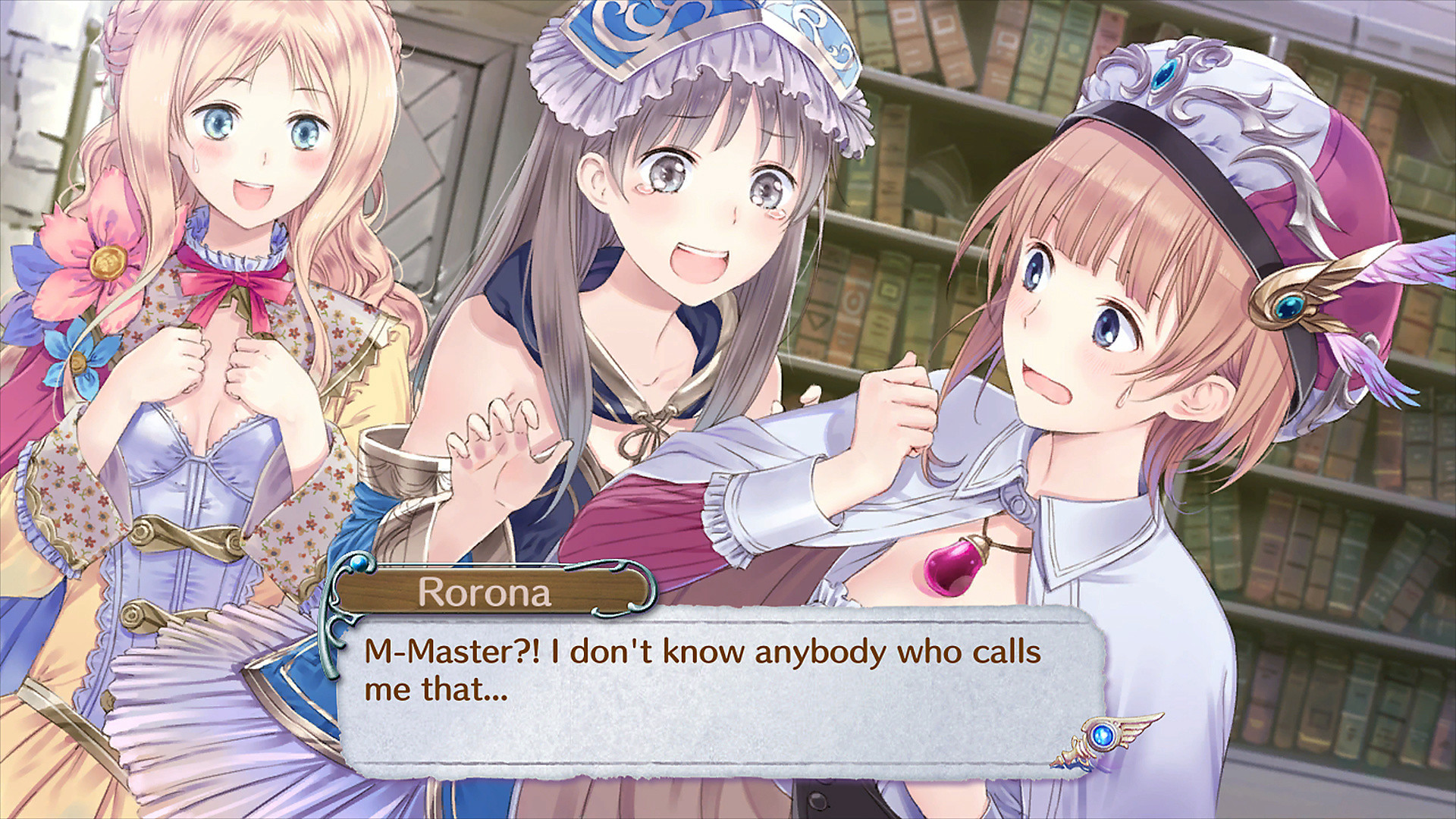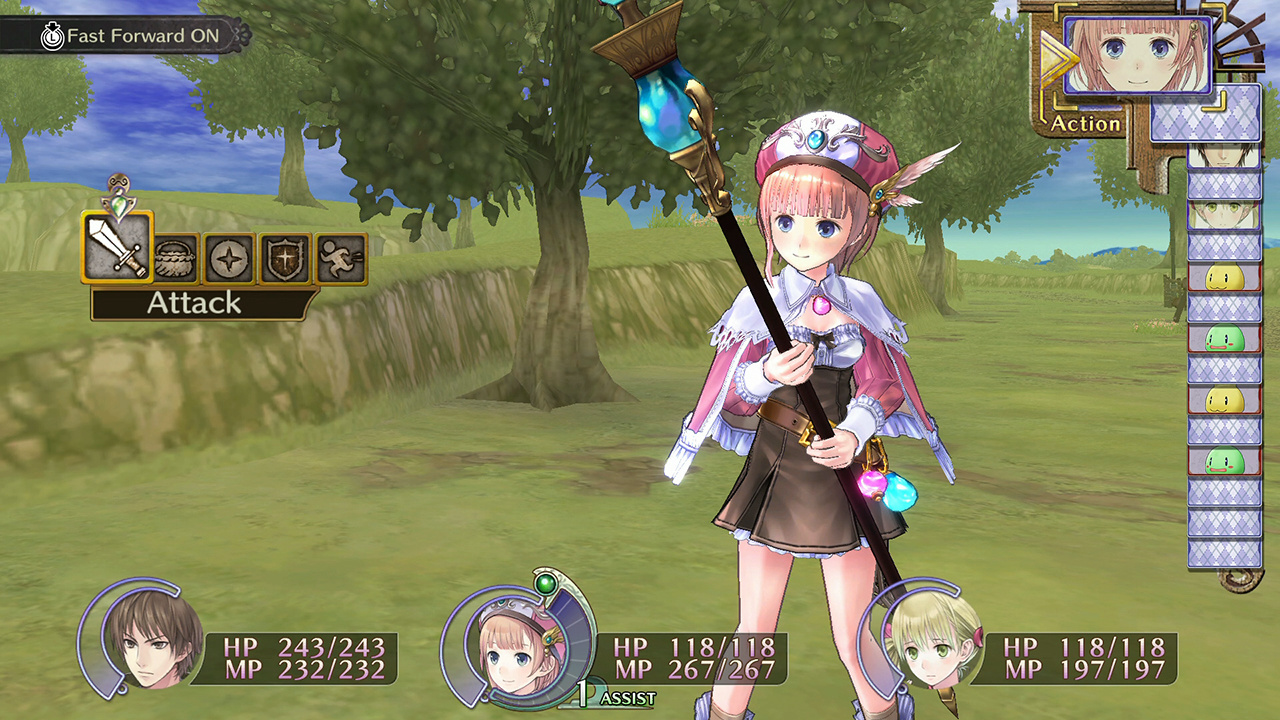Search
[{{{type}}}] {{{reason}}}
{{/data.error.root_cause}}{{{_source.title}}} {{#_source.showPrice}} {{{_source.displayPrice}}} {{/_source.showPrice}}
{{#_source.showLink}} {{/_source.showLink}} {{#_source.showDate}}{{{_source.displayDate}}}
{{/_source.showDate}}{{{_source.description}}}
{{#_source.additionalInfo}}{{#_source.additionalFields}} {{#title}} {{{label}}}: {{{title}}} {{/title}} {{/_source.additionalFields}}
{{/_source.additionalInfo}}- Details
- Category: Computer
- By Jason Gress
- Hits: 6826
Atelier Rorona: ~The Alchemist of Arland~ DX (PC)

Atelier Rorona: ~The Alchemist of Arland~ DX
Developed By: Gust/Koei Tecmo Games
Published By: Koei Tecmo Games
Release Date: December 4, 2018 (original PS3 released on September 23, 2010)
Available On: Windows, PS4, Switch (PS3 and PS Vita as Atelier Rorona Plus)
Genre: Role Playing Game
Number of Players: 1
ESRB Rating: T for Fantasy Violence, Language, Sexual Themes, Use of Alcohol
MSRP: $39.99
(Humble Store Link)
Thank you Koei Tecmo for sending us this game to review!
After my recent review of Atelier Lydie & Suelle, the most current entry at the time of this writing and the 19th Atelier game, I was looking forward to seeing how things have changed; Atelier Rorona is the 11th Atelier game. What I found is an equally lovable set of characters, a strict time limit, and an otherwise greatly streamlined experience, compared to the massive amount of everything Lydie and Suelle had become. Sometimes a ‘back to basics’ approach can be refreshing, and playing this older entry was certainly that.
The game is a fully-rendered 3D role-playing game (RPG), with turn-based battles. The camera is locked in place, but otherwise you can go wherever the invisible borders don’t prevent you from going. It’s not always obvious where those borders are, but you do get used to it. And in what seems to be an important series tradition, the music is simply fantastic. Everyone in my house was humming along while I was playing this game.
In order to gain more power for battles, you both gain levels through experience points in battle, but also become more powerful through buying, finding, or especially forging equipment with the help of Hagel, a recurring non-player character (NPC) in the series who mans the blacksmith. You can forge the materials in your atelier, and you then give them to Hagel, who makes them into powerful weapons and armor. Every time you create something in your atelier, you also gain a separate pool of alchemy experience, which helps you make more and more difficult items. Each piece of material can have one or more traits on them, which is the real secret to powerful equipment. So, the game becomes a cycle of gathering, forging, and combat, in order to meet the posted requirements to save the atelier.

Strong Points: Charming, likable cast of characters; excellent English voice acting; nice art style; great music; solid crafting system; simplified, efficient Atelier experience; performance is excellent even on low-end hardware; good replay value; bonus content after completing that takes place after the Atelier Totori and Meruru games
Weak Points: Time limits significantly impede how much you can accomplish; resolutions above 1080p are upscaled (with aliasing), not rendered at a higher resolution; menu button reactions are oddly slow until you are in them; guides and/or multiple playthroughs needed to see all content
Moral Warnings: Fantasy violence against natural(ish) and mystical creatures, including punis (gelatin blobs), squirrel-like beasts, humanoid creatures, and dragons; curse words including ‘d*mn’, ‘h*ll’, ‘b*st*rd’, ‘sh*t’; alcohol use, including by playable characters (but not Rorona), with drunkenness shown in some scenes; there is some suggestive dialog, including suggestions that a character might touch another while she’s paralyzed, or a desire to see another in a swimsuit; there is a swimsuit/beach scene as well; most of the majority female cast dresses conservatively, but there are notable exceptions with lots of midriff and cleavage shown; magic is used, and crafting new things in a cauldron with components is a massive part of this game
You see, when Rorona was young, her family got sick with a deadly ailment that the genius alchemist Astrid helped overcome. As repayment, Astrid took Rorona as her apprentice once she was old enough. Unfortunately, despite being brilliant, Astrid is also incredibly lazy. As a result, her atelier was about to be shut down, if it did not accomplish certain tasks as required of her by the kingdom. Rather than take care of this herself, Astrid handed over the atelier to Rorona, renamed it as hers, and Rorona was then responsible for meeting the demands of the kingdom. What a great master.
Rorona is clearly not happy about this, but is the type to take virtually any situation and make it positive, if she has the right kind of push from her friends. Thankfully, she gets the push she needs, and sets off to save the atelier. Rorona is incredibly kind, sweet, and... kind of dumb. Yet somehow - through a combination of hard work and dumb luck (and charming those around her through her sweet innocence) - manages to accomplish nearly the impossible, by becoming a famous alchemist, and making many wonderful friends along the way.
The assignments come in the form of required and optional objectives, which the kingdom will reward you for completing. Each quarter of the year brings a new set, and there are three years of testing to complete the process of saving the atelier. If you fail, it will be closed down and made into factories, so no pressure. Depending on the quality of the end result, you will be graded appropriately, which can affect the rewards as well as whatever endings you earn.
Outside of the kingdom-offered objectives, there are also tasks available from the local guild. People in the town will ask you to give them various items, or even kill certain monsters in exchange for money. Completing these tasks is not only your primary source of income, but is also the main way to raise your reputation with the townspeople. In order to see the true ending, you need to raise your reputation to 100%, and get three stars on almost all kingdom tasks. It’s a tough job, but I was able to (barely!) pull it off.
Speaking of endings, there are a ton of them. I was surprised how many scenes in the game are dependent on some combination of personal reputation and being at the right place at the right time, or some other mysterious set of requirements. I missed both the drunken and beach scenes that I have seen others mention, for example. If you follow a guide it probably helps, but I didn’t do that this time.
What I discovered is that there are several items that you can make for house decorations that are not required, but if you miss them, you are really making the game much more difficult for yourself. Since the most valuable asset by far is time, anything that saves time should be prioritized first above all. Also, things that increase bonuses should be prioritized. For me, those have to be the Secret Bag (allows you to put items collected back in the atelier without going home), the Goddess Statue (massively increases reputation on completing tasks), Traveler Shoes (reduces time used when traveling – HUGE time saver) and Flying Carpet (doesn’t send you home when you are defeated in battle, also a huge time saver). There are plenty of other handy things, but if I were to play this game again, those would be what I would make sure I synthesized as soon as it were possible.
As a matter of fact, many of these items I didn’t realize existed until I was quite far into the game. I didn’t synthesize the Goddess Statue until the last quarter, for instance. I ended up needing it also – my last quest completion, which ended up finally bumping me to 100% reputation, was completed on 12/29 of the third year. In other words, on the second-to-last day of the game! If I hadn’t had that statue, I would have never seen the true ending.

Higher is better
(10/10 is perfect)
Game Score - 88%
Gameplay - 17/20
Graphics - 8/10
Sound - 10/10
Stability - 4/5
Controls - 5/5
Morality Score - 76%
Violence - 7/10
Language - 7/10
Sexual Content - 6/10
Occult/Supernatural - 8/10
Cultural/Moral/Ethical - 10/10
After the endings, there is an overtime year where Rorona gets to spend some time with her (future) apprentices, Totori and Meruru, through a strange time travel experiment gone wrong. Since you have not been introduced to these characters yet, it might be best to play this year after playing Atelier Totori and Meruru, which is what I plan to do.
From an appropriateness standpoint, Atelier games are relatively light on issues compared to many of their RPG contemporaries, but certainly have some. The violence is quite mild, but present. Some of the enemies you defeat (who just disappear with a splat-like sound) are human, but most are forest creatures, slime-like things, dragons, and so on. Some demons and such are also included. Alchemists create items through combining other items in some quasi-logical way, and the effects are often magical, combustive (bombs), or healing, poisonous, and more. While most items are generally used to create more items, there are quite a few that can make your life easier in battle as well.
Occasionally, you will hear or see a character use a curse word. I noted ‘d*mn’, ‘h*ll’, ‘b*st*rd’, with the ESRB noting ‘sh*t’. (I did not see it in my playthrough, but it’s nearly impossible to see all character paths to completion in one playthrough given the time limits.) Several characters get drunk in at least one scene, and there is apparently a beach scene that I missed. There is some strongly suggestive dialog, as a certain female seems to have a desire to touch other girls in inappropriate ways, but no actual actions are taken. A majority of the female cast dresses conservatively, but there are exceptions. You can also unlock outfits that include bikinis and so on. They are optional to change into, of course. Most of the game does not revolve around these issues, but they are there.
The PC port is reasonably solid, with great performance overall. I was disappointed to see that the rendering resolution cannot go above 1080p, even though the screen resolution can. Also, there are odd pauses when pressing buttons that bring up the menus. Once you are in them, everything is fine. Nothing is game breaking, and I never had the game crash on me. It performs so well that the game plays great even on my lower-powered GPD Win 2 at a 720p screen resolution, which has integrated Intel video. This system is much lower then the minimum system requirements on the Steam store page, but still runs great.
Atelier Rorona: ~The Alchemist of Arland~ DX is a streamlined, straightforward Atelier game series experience. In many ways, you might consider it the perfect place to start for any potential new players, as it introduces many concepts and mechanics that are not dramatically different in future entries. One funny thing about this game is that I found myself always enjoying my time with it, but without a narrative that really grabbed me, it was easy for me to take a break (which is probably healthy). It’s an easy game to pick up and put down, and fun, all the same. Of course, consider the appropriateness issues, as always. If they aren’t an issue for you, then I would encourage taking a closer look at Atelier Rorona: ~The Alchemist of Arland~ DX. If you like what you see, you may want to consider buying the deluxe pack, which includes the entire trilogy at a significant discount.






